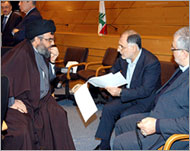Lebanon leaders still split after talks
Rival Lebanese leaders have failed to bridge differences over the fate of Emile Lahoud, the pro-Syrian president, and the disarming of Hizb Allah fighters at a second day of talks.

Political sources said heated debate raged on Friday between Muslim and Christian leaders, both pro- and anti-Syrian, at a “national dialogue conference” at parliament in the largest such gathering since the end of the 1975-1990 civil war.
“Dialogue was comprehensive … responsible, serious and extremely frank,” Nabih Berri, the parliament speaker who is convening the meeting, said after nearly six hours of talks.
“These issues take time because these thorough discussions are taking place for the first time. I believe the results, God willing, will be good.”
The conference, which started on Thursday and reconvenes on Saturday, could last for up to a week.
After quickly agreeing on Thursday on backing a UN inquiry into the killing of Rafiq al-Hariri, the former prime minister, 13 months ago and an international trial for any suspects, the talks moved to more divisive issues such as the fate of Lahoud, who is opposed by the anti-Syrian parliamentary majority.
Lahoud
The sources said anti-Syrian leaders – al-Hariri’s son Saad, Druze leader Walid Jumblatt and Christian former regional commander Samir Geagea – are leading calls for removing Lahoud.
Jumblatt left for a trip to the US but was represented by an aide.
Michel Aoun, the Christian opposition leader, and pro-Syrian Hizb Allah chief Sayyed Hassan Nasrallah were against forcing the president out and highlighted the need for an agreement on a successor and his political programme, in case Lahoud chooses to resign.
 |
|
Hizb Allah chief Nasrallah enjoys |
The talks included a UN resolution demanding that Shia Muslim Hizb Allah and Palestinian fighters should disarm.
The leaders were shown maps said to prove that the Shebaa Farms, an area of rugged hills at the foot of the Golan Heights, belonged to Lebanon.
Israel, which holds the area, and the UN say the farms are Syrian.
Hizb Allah, backed by Syria and Iran, says it is a resistance force, not a militia, seeking to win back the Shebaa Farms and defend Lebanon from Israel.
Anti-Syrian leaders want Shebaa returned by diplomacy and say it is time Hizb Allah disarmed.
The sources said some of the most heated debate was between Nasrallah and Geagea over disarming the group.
Anniversary
Al-Hariri’s assassination in a one-tonne truck bomb sparked massive street protests that forced Syria to withdraw its forces from its smaller neighbour after 29 years. An anti-Syrian coalition swept to victory in elections last year.
 |
|
Security forces have deployed in |
Those changes were hailed at the time as heralding the end of Syrian tutelage, but Damascus’ local allies remain, as do political splits that have often prevented the government from meeting or taking decisions over the past year and have blocked much-needed economic reforms.
Syria backs Lahoud, who has resisted growing calls to step down.
Lebanon’s president is always a Maronite Christian, a sect that has traditionally always formed the backbone of opposition to Syria.
Lebanese security forces have deployed heavily around the parliament building in central Beirut, blocking traffic and pedestrians.
Shops and offices downtown were also shut, bringing life in the usually busy area to a halt.